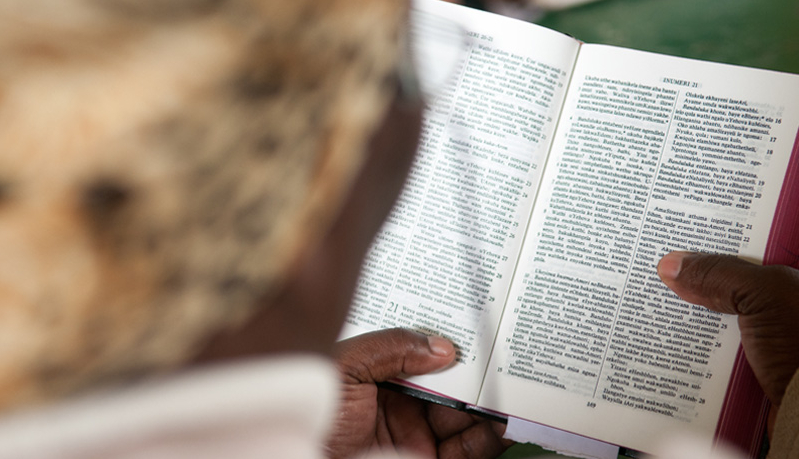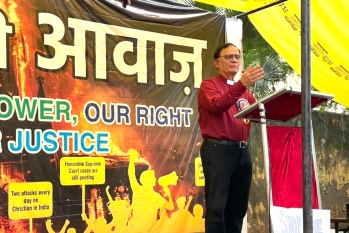
As the son of Bible translators, I’ve grown up immersed in Bible translation work and culture. When I became an adult and decided to join the effort, I imagined myself walking the same pioneering path as my parents before me. I have so far devoted 30 years of my professional life to the mission to bring scripture to all people in their language.
But something remarkable is unfolding in Bible translation right now, and instead of just my parents’ path, I see a beautiful convergence of paths. On the one hand, there are decades of foundational work by a family of Bible translation organizations—linguistic research, cultivated relationships and the patient labor of translation itself. This represents years of faithful service and accumulated expertise. It’s the work my parents loved and devoted their time, talent and lives to. It’s the work I have loved as well.
There’s a vibrant, growing local church movement marked by an enthusiasm and a passion for reaching the unreached.
On the other hand, there’s a vibrant, growing local church movement marked by an enthusiasm and a passion for reaching the unreached. These church leaders’ regional knowledge, cultural understanding and spiritual fervor bring essential elements to the work around the world.
Believers are embracing and building upon the foundational work for their own communities, while those of us who work in Bible translation are being renewed and redirected by this local passion and vision.
The resulting partnership is producing something far greater than either the translation organizations or local churches could achieve alone. It’s a stunning display of God’s wisdom and timing—God's people coming together, each contributing their part, to ensure his word reaches those still waiting.
God’s heart is being revealed to us in new and wonderful ways.
God’s heart is being revealed to us in new and wonderful ways. I recently saw this truth come to life. I met with a small group of pastors to discuss launching a new initiative in their region. I was disappointed that only a handful of pastors had been able to attend, as travel remains challenging in their area of the world.
Yet something incredible happened at the end of the day. As we stood together singing “Great is Thy Faithfulness”—a beautiful moment of harmonious worship in three different languages—I was profoundly reminded that it is not our careful planning or impressive numbers that bring the increase; it is God alone.
One pastor’s story made this even more tangible. Years ago, during the birth of their first daughter, serious complications arose, and doctors delivered devastating news: his wife was dying, and he should prepare to say his final goodbyes. In that moment of desperation, he remembered his sister who had become a believer in Christ. Although she lived in a distant part of the country, he reached out to her with a simple text message.
She immediately mobilized her rural church community to pray. He described how even farmers working in remote fields stopped their labor to intercede for a woman they had never met.
Just an hour after these prayers began, the doctor emerged from his wife's room. The pastor braced himself for news of her passing, but instead he heard words that could only be described as miraculous: “Get her some food; she's hungry!”
As a result of that miracle, the rest of his family immediately placed their faith in Jesus, and he has been fully committed to sharing the gospel ever since. Today, he is excited to engage language communities in his region of ministry that want to be involved in Bible translation.
God brings life from death, purpose from pain, and uses ordinary people to accomplish extraordinary missions.
This pastor's journey to becoming a translation advocate, propelled forward by the miraculous fruit of one desperate text message, embodies everything I believe about how God works. God brings life from death, purpose from pain, and uses ordinary people to accomplish extraordinary missions.
Looking back, I can say that I've experienced my own profound journey of transformation. Initially, I joined the Bible translation movement to continue the legacy of my parents’ translation work. Their approach to reaching the nations was part of my DNA, and for years I viewed God’s heart for the nations as being fulfilled primarily through my efforts and the efforts of those like me. But as the global landscape evolved, our methods necessarily shifted as well. I confess this transition wasn’t easy for me.
God desires not only to reach the nations but also to include the nations in the work.
Yet God has gently reshaped my understanding of his heart. I came to realize that God desires not only to reach the nations but also to include the nations in the work. His plan is to make room for local believers—the very fruit of my parents’ generation’s faithful service—to participate fully as vital members of the living, breathing body of Christ.
In recent years, I have witnessed a beautiful evolution from the pioneering model of the early decades of Bible translation to the full, active participation of local believers in sharing God’s Word, not only with their own communities but with the whole world.
This new layer of involvement represents something remarkable—a maturing church that has grown into its calling, equipped with capability, skills and passion to meet the needs of their generation and generations to come.
God’s mission isn’t just about reaching the nations; it’s about the transformation that sees indigenous churches transition from recipients to agents of God’s word. What moves me most is realizing that Bible translation itself reflects God’s incarnational nature—the Word becoming flesh in each unique cultural and linguistic context, making his presence known in deeply personal ways.
How might God want to use me?
As we continue to witness this transformation, let’s trust God’s process. He is the one who brings the increase, using all of us in the body of Christ—no matter our background—to accomplish his purposes. And let’s each ask ourselves: "How might God want to use me?"
Daniel Watters grew up in Asia, where he experienced firsthand the life-changing impact of Bible translation through his parents’ work in a remote language community. Inspired by their example, he joined Wycliffe USA in 1992 shortly after earning a Bachelor of Arts in linguistics from the University of Washington. He later completed a Master of Arts in linguistics and exegesis at Trinity Western University in 2000. From 1994 to 2019, Daniel served in Asia through Wycliffe USA and a partner organization, holding various administrative and leadership positions. Today, Daniel serves on the Global Partnerships team at Wycliffe USA.






